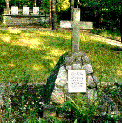www.DarbyRangers.Com | Follow Me
Stalag IIB
Unclassified
American Prisoners of War in Germany (1)
Prepared by Military Intelligence Service
War Department
15 July 1944
STRENGTH: 4,807 enlisted men, all ground force
LOCATION: Pinpoint; 53 degrees 41' North Latitude, 16 degrees 58' East Longitude. Camp is situated one and a half miles west of Hammerstein on the east side of a highway leading to that City.
DESCRIPTION: Camp sprawls over 25 acres, divided into 4 compounds and separated by barbed wire fences. Americans occupy 5 one-story stone buildings. Three-tier bunks are too numerous for barracks' cubic space and quarters are overcrowded. POWs sleep on tables, chairs, or on the floor, while awaiting shipment to work detachments. Within enclosure are canteen, small playing field, workshops, rooms for religious services and recreation, dispensary, showers and delouser. Entire camp is surrounded by 2 barbed wire fences. Base camp houses 1000 Americans, consisting of permanent camp staff, non-recognized NCOs, medics and physically unfit. The remaining 3,800 are on 141 work detachments; some as far (as) 350 kilometers from base camp.
TREATMENT: Treatment varies, depending on the work detachment, but is generally bad. This is the worst American P/W camp in Germany. Eight Americans have been shot and killed while on work parties.
FOOD: Major portion of POWs' food comes from weekly Red Cross parcels. German ration is insufficient, consisting of hot water for breakfast; water soup with 7 small boiled potatoes per man for dinner, and 3 slices of heavy black bread and a slice of sausage for supper. Food on work parties is usually better than in the base camp.
CLOTHING: Usually no clothing is issued by Germans. The only source of supply is the Red Cross. Each P/W has been supplied with an American Uniform and pair of leather shoes. At one work detachment American clothing was taken from POWs and Germans issued one uniform and one pair of wooden shoes per man.
HEALTH: Two American doctors are assisted by American Orderlies in caring for the sick and invalid. Medical supplies are urgently needed. Hospital facilities are inadequate. Treatment of teeth is good but material is lacking. Men on work groups frequently go to (the) nearest city for medical treatment by civilian doctors. Health is generally good.
RELIGION: There is no American Chaplain but a US Enlisted man is recognized by the Americans and Germans as "Acting Chaplain".
PERSONNEL:
American Senior Officer: Captain Wilber McKee, MC
Man of Confidence: Pvt. Harry Galler
Interpreter: Pvt. Gunner Drangsholt
German Commandant: Oberstleutnant yon Bernuth
MAIL: Average transit time for all letters both to and from camp is 3 to 4 months. Receipt and transit times are erratic. Next-of-kin and tobacco parcels arrive in 3 to 4 months. They are frequently pilfered.
RECREATION: Outdoor activities include football, baseball, softball, and basketball.
Equipment was received from YMCA. POWs also attend religious services and orchestra and camp shows. Classes were recently started in a variety of subjects but (the) Germans discourage this because they desire to keep Stalag IIB strictly a work camp. POWs have a library of 1000 books. They have received phonographs and records from the YMCA.
WORK: All privates must work. NCOs may volunteer. The majority of the POWs are employed on large farms in Pomerania where the main crop is potatoes.
PAY: Working POWs receive 70 pfennigs a day in lagergeld. Non-working POWs receive no pay.
Unclassified
# # #
 Museum of Allied POWs
Martyrdom in Zagon'
Mausoleum
Lotnikow
|
|
1. Unclassified Copies of these reports were made possible by the American Ex-POW, Nat'l HQ
3201 East Pioneer Parkway #40, Arlington Texas 76010-5396 Phone #817-649-AXPW; reports of other Stalags and related documents are available for purchase thru their HQ.